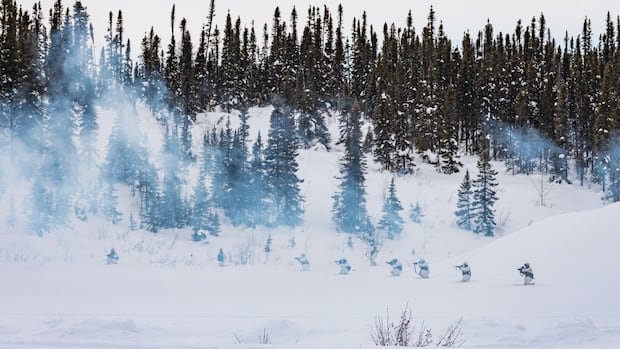Canada is set to enhance its military training activities in the Arctic by extending the deployment of various forces in the region for up to 10 months annually, starting this year, according to the military’s operations commander. Lt.-Gen. Steve Boivin announced that the military’s key Far North exercise, Operation Nanook, will undergo expansions with additional elements to establish a more significant and consistent presence in an area that is increasingly becoming a focal point of geopolitical competition.
The strategy, as highlighted by a defense expert, presents a unique opportunity for the Liberal government to showcase Canadian sovereignty in the Arctic and unite NATO allies in support of the country. Michael Byers, an expert in Arctic affairs and geopolitics at the University of British Columbia, suggests that major allied nations should be encouraged to participate more extensively than before, signaling solidarity at a time when the Trump administration has expressed intentions to assert economic pressure on Canada and potentially use military means to acquire Greenland.
Boivin emphasized that while inviting allies is part of the plan when deemed appropriate, the primary objective is to bolster Canadian presence with more boots on the ground, warships in the waters, and aircraft flying over the vast Arctic territory. He expressed the goal of maintaining a near-continuous presence in the Arctic, aiming to extend the current Operation Nanook duration from five to six months a year to over 10 months annually.
The Liberal government has intensified its focus on the Arctic, appointing a dedicated minister in recent cabinet appointments and injecting an additional $420 million into the Department of National Defense budget to establish a more sustained military presence in the Far North. Boivin revealed that the directive to expand Operation Nanook was issued before the government’s funding announcement, instructing military personnel in September to develop an enhanced schedule involving seven training regimes under the annual exercise, as opposed to the usual four.
The initial exercise under the expanded plan, Operation Nanook-Nunalivut, occurred in February near Inuvik and the Mackenzie River Delta in the Northwest Territories, engaging 450 Canadian troops alongside approximately 110 armed forces members from the U.S., Belgium, U.K., Finland, Sweden, Norway, and Denmark.
Byers suggested that while involving allies symbolically is crucial, in the current geopolitical context, it could be leveraged further to benefit Canada. He proposed imaginative ways for allies to support Canadian sovereignty, including inviting a larger contingent of Danish troops to participate in an exercise covering the Canadian Arctic and Greenland.
Furthermore, Byers emphasized the significance of not excluding the U.S. from the Canadian Arctic, advocating for regular invitations to the U.S. military and coast guard as a strategic approach to counter President Trump’s challenges to Canada’s nationhood. Engaging the U.S. in such activities would acknowledge Canadian leadership and sovereignty, strengthening bilateral ties based on geographical proximity.
Norway hosts an annual multinational military exercise, Exercise Nordic Response, involving up to 30,000 NATO troops and personnel in its terrain and waters. Although Canada has traditionally refrained from hosting a NATO-level exercise in its Far North, the idea was previously discussed in defense circles following a visit by former NATO secretary general Jens Stoltenberg to the Canadian Arctic.
Ed Arnold, a senior research fellow at the U.K.-based Royal United Services Institute (RUSI), highlighted that increased allied participation in Canada’s North would boost morale within Canadian and European NATO circles, besides reinforcing nuanced sovereignty arguments. The move might also send a strong message of unity and support in the face of external pressures.
Arnold expressed concerns over the relative silence from many of Canada’s allies regarding Trump’s annexation threats and assertive rhetoric, indicating a potential disappointment and annoyance among Canadian and Danish officials. He stressed the importance of maintaining unity, particularly through visible support from more influential European nations, to uphold smaller nations’ interests in the current security environment.
In conclusion, a greater NATO presence in the Arctic would not only signal solidarity and support for Canada but also underscore the country’s integration within the Euro-Atlantic security framework, dispelling notions of isolation and affirming shared defense responsibilities.


